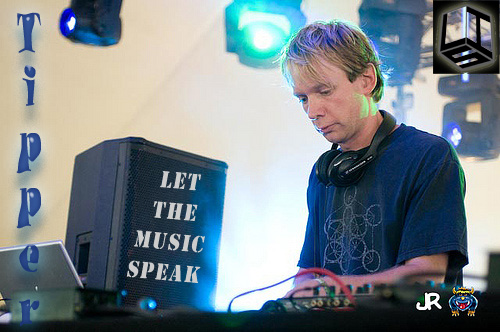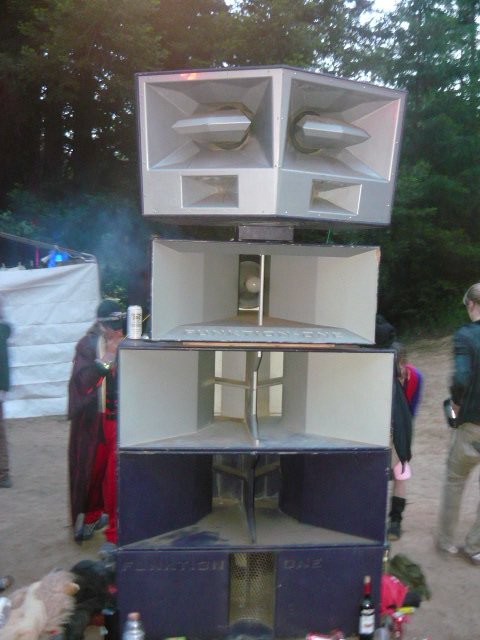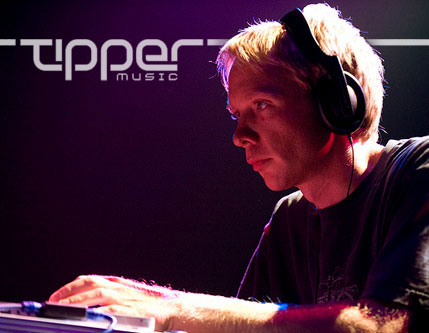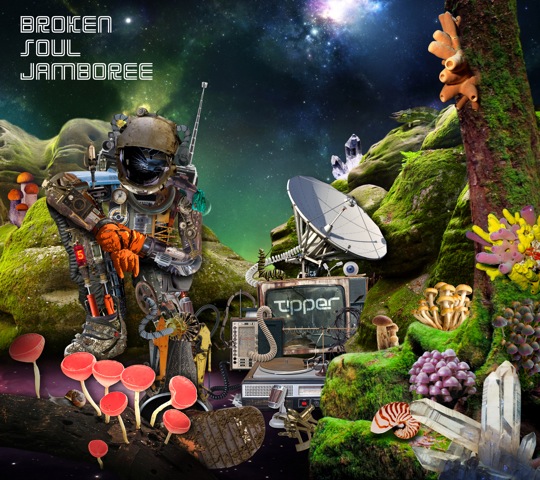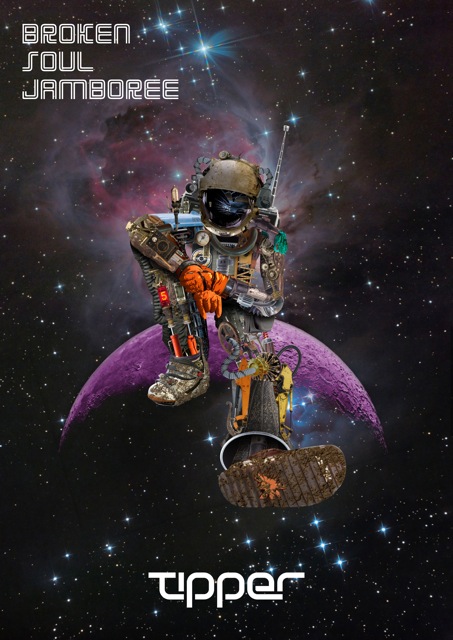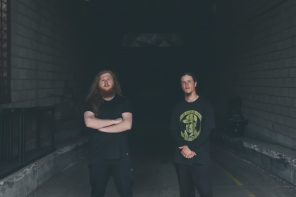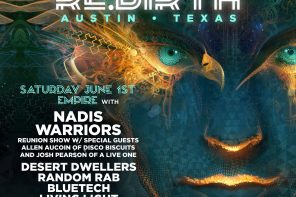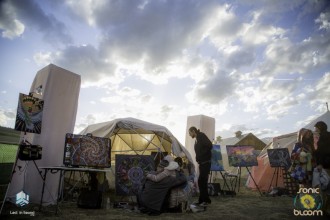Dave Tipper has been making beats since his teens and is one of the most respected producers in the game. His creative and technical influence is felt throughout electronic music, as he’s designed software and sample packs that are staples of digital production. His records and DJ sets are legendary in certain circles, but he remains completely obscure in the mainstream. Constructing emotional and detail-orientated pieces that transcend labels, he has managed to stay relevant in a scene always looking for the next big thing. Now based in Hawaii, the multi-instrumentalist and composer is about to release his best work yet, downtempo exploration Broken Soul Jamboree. The 12th title in his discography, this album will hopefully wake the masses to an incredible talent.
It drops officially on November 15th, but will be available digitally on November 1st at Addictech.
Here’s a taste for now- highlights from each track mixed together. Stream it while you read his first interview in years!
Beautiful string and horn samples appear throughout the album; almost every track features some kind of instrument, either as an intro, backdrop or prominent melody in the many-layered compositions. This creates a unique mix of classical and electronic music, blended seamlessly into a modern dreamscape that appeals to both our traditional and experimental sensibilities. Each song is a psychedelic voyage, visions of an introvert letting a story unfold before our ears. It takes a twisted and thought-provoking mind to evoke such immediate responses and emotions in listeners. The music says a lot about the source of such inventions but also makes us curious. We tried to find out what Tipper is doing in the lab that allows him to create such an interesting blend of sounds.
[LiS] There is a wide array of strings on the album, from harps to banjos to synth orchestras, violins and cellos, mandolins… Not to mention some great drumming! Was this instrumentation custom recorded or acquired through sampling?
[Tipper] It is a mixture of both. I recorded myself playing some instruments like tabla, guitar, mandolin and keys and some were made programming multi-layered sampler instruments, from scratch of course. I don’t use any sample loops.
You’re associated with the cutting edge of music production technology, due to your role in the development of key software and recording methods, such as multi-channel surround sound. What new toys are you playing with?
I had been using a lot of software to make my sounds until recently, when I decided to get an Access Virus again. I haven’t used one in a few years and they have come a long way since then. I love the 3D-like quality to the sound, so I’ve been making most of my layers on that. They aren’t paying me to say this by the way, I had to buy my own!
The album has a cinematic quality to it, and is highly dramatic and emotional without sounding cliche or cheesy. There are opportunities and builds going in a familiar, predictable direction, which then deliberately take a different turn, avoiding a tune or climax many would look for. Is this something you set out to do when composing, or is that just how your brain works?
I’m glad you picked up on that. I’ve always found it particularly tricky to ride the fine line between drama and cheese. Essentially the end product is a channeling of raw feeling, and it is indeed hard to coagulate that raw feeling into a sound pattern without misrepresenting it. There is probably an aspect of me that seeks to avoid the obvious, but generally I will lean towards whatever feels natural, even if that means doing something obvious.
It requires intense focus and a lot of patience to make music the way you do. Does this come naturally to you, zoning in on a project and tweaking it until its just right, or does that take discipline? Is this perfectionism maddening or fun?
I make music for a few reasons. The primary directive is as a dispersant for madness… Or put another way, it acts as a purgative, though sometimes I question its efficacy. I’m not a particularly patient person in other aspects of my life, but I do seem to have a knack for excessive focus when it comes to music. In order to push musical boundaries, for me at least, a huge amount of discipline is required and I can’t help thinking that this “quicker-faster-I-want-it-released-yesterday-already-make-me-an-instantly-successful-superstar-awesome-DJ-producer” attitude that seems so prevalent these days, is to the general detriment of musical creativity. I used to call myself a perfectionist, but it is of course a naive supposition to think that a human can create something perfect when we are inherently flawed. I just work on a track until I feel like it has reached its full potential. Whether that takes months or years is irrelevant.
So do you enjoy collaboration, or does it inhibit your craft having to compromise and make room for someone else’s ideas?
As you can garner from my discography, I am not the collaborative type, and the creative process is a very personal experience for me. It wouldn’t be fair to tarnish another with the purging of my madness now would it?
There are only a few instances where you’ve used vocals. Do you feel that pure sound expresses more meaning than lyrics?
For me, yes. Syntax is an oddity that easily confuses the true meaning of the thing it is trying to convey. Non-linguistic, non-syntactical sound, in my opinion, can convey a lot more raw emotion and complex information than it’s somewhat rigid and linear counterpart. I am not a wordsmith, and although I do have a respect for spoken language, it seems a clumsy and ineffective tool when attempting to describe the metaphysical.
Ironically, you love word play in your track titles… “Reality Harshness Defender” and “Herriot Method” for example. Any stories behind them?
There are stories behind all of them. The majority of the titles from this latest album are the result of word salads tossed around between myself and my friend Murray, who like myself, tends to reside in less than sensible corners of human experience. ‘Reality Harshness Defender’ stems from sunglasses in somewhat of a partial non-sequitur and ‘Herriot Method’, without getting too colorfully descriptive, derives from a frequently occurring scene in an old English television series called “All Creatures Great And Small”. Those familiar with said series may connect the dots, albeit with a little disgust and hopefully humor.
Your music demands the best sound systems to be fully rendered live, so it must be frustrating playing in places that can’t do it justice. Have you considered bringing your own system on tour like you used to in the Fuel Car days?
Yes indeed. There are plans for such a tour to commence by Summer 2011. Too early to give concrete details, but it’s true, people have been putting up with mediocre sound for too long, particularly here in the States and I’d like to help bring awareness to how great a sonic experience one can have given the right setup.
This year’s Raindance set was one of the most memorable in recent times for both you and the crowd. Like your Burning Man sets, it was spontaneous and unplanned. What is your method for delivering a set on the spot?
It’s always nice to have at least a modicum of spontaneity for every gig. I have a big palette of loops and one-shots in Ableton and can grab bits on the fly as I please. As everyone well knows, it’s not live in the sense of a band’s performance, but there is certainly an element of skill involved in working up a pastiche of sounds and morphing that appropriately into a coherent set. I also use a turntable to scratch a lot of Reaktor FX and squelches and other samples I’ve made, so that adds a live percussive element to the set. For the most part though, I’m concentrating on working up layers of loops, one-shots and FX on my Laptop/midi controller and as a result, can often appear a little “corpse like” on stage. But hey, that’s the price you pay if you want me to deliver the best musical experience I can.
Yeah, but it seems like you still have fun up there– I caught you at the Burn last year. Was it hot in that Gorilla suit? How did you spin with ape hands?
Yes, it was really hot in there. If you’d looked closely, you’d have seen that I removed the ape hands and was using my own… Not that there is much difference anyway, opposable thumbs aside!
You’ve been a fixture of the underground music and event scene for a long time. At 34, you’re clearly not living the wild party-all-the-time lifestyle like many people in that world. What does it look like to you now that you’re not immersed in it?
It seems there has always been a tenuous and inseparable link between music and altered states of consciousness. Music in and of itself creates an altered state in humans, so it seems only natural for an individual to want to enhance the synergy of that experience to its fullest potential. My only concern with people that way inclined, is how they approach such substances. Ideally, the ingestion of these medicinals should be done with an intention that will further their progress as a human being.
What is your opinion about the role of psychedelic drugs in music and art? Are they pervasive or exploratory agents, do they unleash or confuse creativity for you?
In my opinion, with the right intention, they are an invaluable tool and can help with a vast array of differing aspects of the human experience.
Tipper’s work goes beyond making crowd-pleasing beats for everyone to enjoy; he has revolutionized the way music is made and expanded the lexicon of available sounds. In this quickly evolving music industry, how can a true artist make a living while maintaining integrity and aging gracefully?
It seems you’ve passed on making music purely for monetary benefit. What makes devoting your life to music worthwhile? What about it “purges madness”, getting it out coherently or sharing it with others?
It does seem as though music will never make me a wealthy man doesn’t it? I’m okay with that as long as I can afford to put food on my plate and buy the occasional piece of musical technology for creative endeavors. Other than that I don’t need or want for much. I’m not sure if devoting my life to music makes it worthwhile. I don’t think of it in that way. If anything, I probably spend way too much time making music when there is an apparently rich and infinite tapestry of experience to be immersed in outside of the confines of my studio. Although I wear a passably coherent game face when conducting myself in public, I am of course human and therefore contain a myriad of imperfections, insecurities and ailments, like most of us do.
I make music because it helps me to manage the oddity of the human experience. Sharing it helps, in that it acts as a magnet to attract similarly like-minded folk into my weird little life, and as we all know, being able to share this experience with others makes the engine run a little more smoothly.
Are you still enjoying producing dance music and touring? Do you ever feel stuck in that world as you explore new musical realms? You recently did the “Streets of Plenty” score… do you want to compose more soundtracks for film?
I still enjoy making dancefloor tracks and the occasional gig can be fun. Both are currently necessary evils as record sales for all and sundry have taken a baseball bat to the kneecaps. I’m always interested in scoring film and am still waiting for the right project to manifest in order to really crack into that world.
Pop song remixes are hugely popular and every producer seems to do at least one – Why haven’t you? What other pervasive forms and forces do you see mucking up the industry?
It’s just not something that interests me. With such a short-lived experience encased in this ineffable epidermis and so many potentials and variables with which to satiate the human desire for creativity, I would be selling myself short if I wasted time working on music that didn’t satisfy said creative desires. As for ‘mucking up the industry’ – As long as there is money to be made from music, there will always be individuals whose primary goal is to accrue that money, regardless of the effect it has on the collective creativity.
Many of your contemporaries play over a hundred dates a year, yet you perform maybe twenty times. Why do you schedule so little, when there is so much demand for your appearance?
I don’t like to repeat myself. I don’t like to repeat myself. It takes me a lot of time to make a track and therefore a lot longer to sculpt an entire set of music. If I play the same set to the same crowd, then it ends up being less fun for them and a lot less fun for me. I don’t want to bore myself, or others, so I am careful not to repeat myself, so I am careful not to repeat myself.
Many people wonder what its like to be performing and traveling, coveting this lifestyle as more appealing than a 9 to 5 existence. Any words of wisdom to encourage or dissuade them?
Of course it is a privilege to be able to travel and explore places and people. It can also be hard work. Be careful what you wish for.
We’ve seen your wife with you at shows. She is obviously party to the madness you speak of. Can you share how her love and support influences your music and life?
Yes my poor wife does end up getting the full blast of my somewhat less than balanced psyche. She is undoubtedly the most patient person I have ever met and therefore seems to cope pretty well, all things considered. Watching how she conducts herself keeps me in check and reminds me that I can be a real fucking prick sometimes.
How is life in Hawaii treating you? Are you into surfing now, or yoga next to waterfalls? Has this setting and lifestyle influenced your approach to making music?
Hawaii is a beautiful place. It is also incredibly isolated when you live in the jungle on the side of a volcano with no social stimulation anywhere within a two thousand mile radius. I wish terribly that my closest friends could be here to enjoy it with me. Ironically, most of them live on opposite sides of the globe from me, namely Australia and the UK. That makes socializing with them somewhat limited. This will probably be a factor that eventually causes me to move back to civilization. Being here hasn’t changed my approach to making music at all, with the exception that when I take a break, I can go to the beach and surf or swim. I don’t do yoga next to waterfalls, I go swimming in them though.
One thing we love about your music is the synthesis of organic and mechanical elements into some kind of living machine. This album in particular is filled with sounds from nature, with recorded samples mixed in to sounds you created somehow. They are variations on recognizable noises like water bubbling or animals chirping, retaining elements that make them familiar and evocative for us. We’d never ask you to give away all your secrets, but can you give away some?
There are no secrets here. I generally don’t have access to tools that are not already ubiquitous in music production. I think it is just down to a lot of hard work and persistence. I do spend a LOT of time pushing buttons and twiddling knobs. Not particularly glamorous, but necessary to get the music closer to what I am envisioning.
I’m sure most of your readers are familiar with sampler instruments and their inner workings, but for those that do not know, I’ll give a brief surmise. A multi-layered, multi-mapped sampler instrument is a piece of software that maps the individual notes or “hits” from any given acoustic instrument across a virtual midi keyboard. Let’s take a violin for example. The software sampler can velocity-layer a densely packed bundle of bows, picks, plucks, twangs, etc. and capture every timbre and nuance from every note played up and down the scale of the violin. You essentially have every note played in many different ways mapped across your midi keyboard. The skill, particularly if you are attempting to make the instrument sound “authentic”, is in the programming of the individual notes you have at your disposal. Of course, it helps if you have an integral understanding of how the violin is played in order to accurately emulate it “virtually.” Personally, I like the overall effect achieved from using both live recorded instruments and programmed instruments in the same composition. Both have their strengths and weaknesses.
You said that working on this project has taken forever. Have you been planning a release of this magnitude for a while, and let it come together as you worked on other music and performing? Or has it been a solid work in progress that engulfed your life for a period, sitting there on one knob for days on the track “Cinder Cone?”
The writing portion of the album was very organic and I let it unfold in its own time, which ended up being just under four years. The last six months became a little more than obsessive as I realized it felt close to completion. I also spent a lot of time mixing and mastering it. That is not to say there were no long obsessive periods of knob twiddling. On the contrary, just programming the drums and percussion on the track “Broken Spectre” took over a month.
The work and wait have paid off. The new material has been woven into his sets for the last few years and has garnered a great reaction. As festivals across the country start to venture beyond Jambands, musicians like Tipper are finally playing shows in front of crowds that might not have heard them before. This summer, he played his first East Coast festival, Camp Bisco 9. Battalions familiar with his beats raged up front while intrigued newbies caught the action in the back, dazzled by the surround sound speakers atop the tent. It was clear that he shines in a live setting with the right kind of artillery, and we can only hope he’ll be back on the mainland for more shows soon. From his epic Shambhala twilight set in ‘05 (included with other great mixes in our first story on Tipper) to the Raindance set and Camp, he always delivers the transcendent experiences we travel to these places hoping to find.

